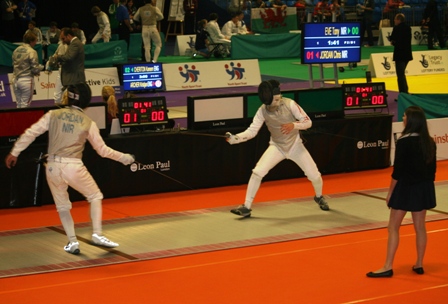
Full details of the five-event Coaching Insights autumn programme are now available.
Six and out: the end of the UK School Games
With European football internationals in progress and world championships either ongoing or imminent in athletics, rowing and rugby union, the cream of British journalism were absent from the sixth and last UK School Games; apart from The Leisure Review of course.

Imogen Buick in action in Wharncliffe and Wheata Woods
Photo: Action Images /John Marsh
As Usain Bolt was rounding off his week in South Korea with a world record in the sprint relay the UK School Games, in that other left-wing heartland, the people’s republic of South Yorkshire, was in its fourth and final day. With opening and closing ceremonies, medals and podiums, a full complement of officials and an athletes’ village, the Sainsbury’s-sponsored event was delivering an authentic multi-games experience against a multiplicity of agendas.
Having been invited by the Youth Sport Trust (YST) to experience the games for the first time, The Leisure Review was keen to see what these agendas might be, what the games looked like up close and to enjoy some good-quality sport in a city whose sporting landscape was transformed twenty years ago when it hosted the World Student Games.
Following the 1991 Universiade, Sheffield was the first British city to use events to drive sports development and the School Games is only the latest major event to visit the Steel City. With an English Institute for Sport centre in the Don Valley, the first soccer club in the world and the continued drive of former sports minister Dick Caborn, the city has a sporting legacy that makes it a fitting venue for the final UK School Games. When we bumped into Mr Caborn he was on his way to take in some judo with his grandson and clearly enjoying the fact that an event he always championed had come to his home town. Quite what he thought of the current government’s decision to replace the event in the calendar with their own Schools Olympics was not ascertained but, with the YST in charge of both, there will be a reassuringly good deal of “continuity going forwards”. The Daily Telegraph is indeed so convinced that business will continue as usual that one of their web editors excitedly announced on the Saturday of the Sheffield event that “Four Olympic Games venues will host the seventh UK School Games in London next year”, quite missing the point that next year will be something different.
The Tory press are of course focusing on finding as many benefits of Michael Gove’s slicing and dicing of school sport as they can but replacing an integrated system of sports development aimed at both driving up standards of physical education and increasing all school pupils’ access to and engagement with physical activity with the opportunity to take part in competitions at four levels (intra-school, inter-school, regional and national) seems somewhat short-sighted. Perhaps that is the point; for a government led by a PR man sport only means profile and after the Lord Mayor’s show that is the London Olympics no event or achievement will be able to deliver anything which Cameron can make use of; so why fund it? Ignoring, if you can, the decimation of the school sport co-ordinator programme, the replacement of full-time partnership development managers with three days a week of a school games organiser will surely mean a move from sports development to activity management and, for those not versed in the jargon of the former, that is a bad thing.
However, on a sunny Friday morning with 12 sports to sample, the post-Olympic funding meltdown is a distant concern. Following an arm wrestle with a hire car’s satnav our party reached the Don Valley and the two-ring circus that is iceSheffield. For the duration of the games the centre’s two Olympic ice pads have been transformed into a gymnastics hall and a judo dojo. With the larger of the two spaces awaiting a Saturday start, the focus is on the nation’s best young judo players. A quick check of the event brochure shows that this is not just a development event. Judo was probably the best-quality event in the programme with players including a silver medallist at European level and the event itself being described as “the only tournament that enjoys Level Five status in the UK and is classed as a major international.”
Judo takes the UK Schools Games seriously, cementing their event in the governing body’s competition framework and stating that in the eyes of all four home countries’ associations, “It is agreed that this is the ultimate domestic event for young judoka.” Each of the sports that have won the right to be part of the games, and there is real competition to be involved apparently, uses the opportunity in a slightly different way. Girls rugby sevens simply select a team from their existing fifteen-a-side under-18 divisional squads while volleyball pick age groups which “enable the training squads to sit just below the junior national teams”; and their boys and girls squads are at different ages with three English regions represented, two Scottish and one each from Northern Ireland and Wales.
In an idle moment a study of the team designations chosen by each sport is diverting. Why, for example, does badminton refer to Northern Ireland as Ulster? What possessed athletics to have squads named for cities, which meant that a lad from Loughborough was competing for Gateshead while a hurdler from Brighton was in the Bristol team? How can rugby union miss out Northern Ireland altogether while swimming included a team from Ireland? Clearly the needs of the sports and their development programmes outweighed those of the marketing team, a rarity in the modern world and one which should be applauded even as we wonder exactly where England Eastern might start and finish.
If the rationales behind some decisions seem a little obscure one of the many messages that comes through loud and clear is that this event is about young people, and not just participants. The determination that the event shows to developing young officials is beyond ‘significant’: it actually inspires awe. The YST have what Sue Campbell calls an “ongoing commitment to creating the sports leaders and officials of the future” and this is evidenced not in the teams of ball boys and girls at the volleyball arena or the youthful door-keepers checking passes but at the centre of the stage. A young man competently and quietly referees a judo bout; a smartly dressed young woman manages a fencing piste without any fuss whatsoever; and all over the city young people arbitrate, record and facilitate the action. There are adults in the mix, taking their turn in the rotation and mentoring their younger colleagues, but they do not seem to be dominating the proceedings. These are the UK School Games and they belong to the school students for whom they were envisioned.
With a junior world champion taking part in the fencing event and a world record actually being set in the pool during these games it is clear that performance levels are of the highest order. The governing bodies obviously value the event, with at least one of next year’s Olympic coaches spotted preparing a squad to play, and Sheffield had made its own very significant commitment to making it happen. The Legacy Trust, Sainsbury’s and Sport England all feel constrained to support it financially. Everything about this competition shouts quality, professionalism and dedication. Which only serves to underline the idiocy inherent in the decision to make them “the sixth and last UK School Games”.
The Leisure Review, September 2011
© Copyright of all material on this site is retained by The Leisure Review or the individual contributors where stated. Contact The Leisure Review for details.
Download a pdf version of this article for printing
